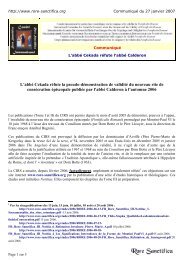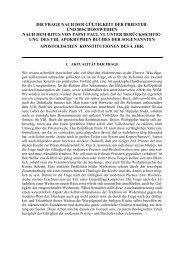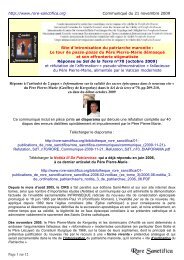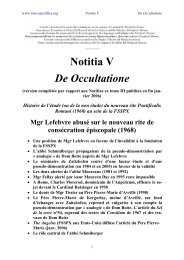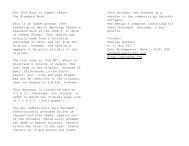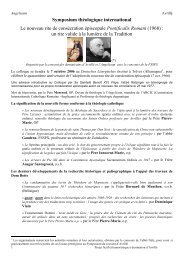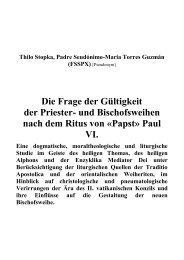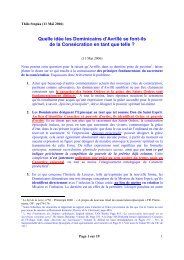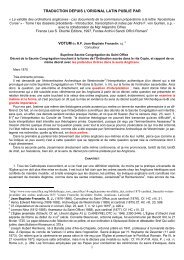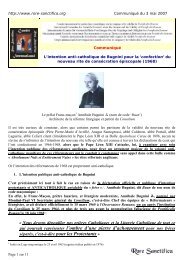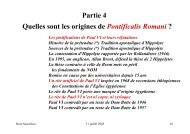THE ORDER OF MELCHISEDECH A Defence of ... - Rore Sanctifica
THE ORDER OF MELCHISEDECH A Defence of ... - Rore Sanctifica
THE ORDER OF MELCHISEDECH A Defence of ... - Rore Sanctifica
You also want an ePaper? Increase the reach of your titles
YUMPU automatically turns print PDFs into web optimized ePapers that Google loves.
the intention (<strong>of</strong> the minister) will not supply this deficiency" 15 That is to say, a defective rite can<br />
never be used to confect a Sacrament, even when used by a lawful minister with the correct<br />
intention.<br />
The question <strong>of</strong> ministerial intention is incidental to Pope Leo's case, since defect <strong>of</strong> form alone is<br />
sufficient to render the Anglican rite invalid. All that the Pope is doing is to point out that when<br />
Queen Elizabeth I instituted her new Protestant hierarchy with the "consecration" <strong>of</strong> Matthew<br />
Parker as "Archbishop <strong>of</strong> Canterbury" in 1559, the re-introduction <strong>of</strong> the Cranmerian Ordinal, with<br />
its pronounced anti-sacerdotal signification, in place <strong>of</strong> the Sarum Pontifical (which had been<br />
restored under Queen Mary), manifested an external intention incompatible with the conferring <strong>of</strong><br />
the Catholic Sacrament.<br />
Apologists for the validity <strong>of</strong> Anglican Orders have made much <strong>of</strong> the slight revisions made to the<br />
Ordinal in 1662. The words "for the <strong>of</strong>fice and work <strong>of</strong> a priest in the Church <strong>of</strong> God now<br />
committed unto thee by the imposition <strong>of</strong> our hands" were added to the indeterminate form <strong>of</strong> the<br />
1552 Ordinal. The complete 1552 form read:<br />
Receive the Holy Ghost, whose sins thou dost forgive, they are forgiven; and whose sins thou dost<br />
retain, they are retained. And be thou a faithful dispenser <strong>of</strong> the Word <strong>of</strong> God, and <strong>of</strong> His holy<br />
sacraments: in the name <strong>of</strong> the Father, and <strong>of</strong> the Son, and <strong>of</strong> the Holy Ghost. Amen.<br />
The word "priest" does not occur in this form, which remained unchanged when the 1552 Prayer<br />
Book was restored to use with some revisions under Elizabeth I in 1559, after the return to the<br />
traditional rites during the reign <strong>of</strong> Queen Mary. The failure to use this word in the form itself,<br />
although the word priesthood is used elsewhere in the rite, is <strong>of</strong> considerable significance.<br />
Apologists for the validity <strong>of</strong> Anglican Orders lay great stress on the fact that an ancient form has<br />
now been discovered (The Sacramentary <strong>of</strong> Seraphion), 16 where the word is also not used. the<br />
comparison is irrelevant as there is far more significance attached to the removal <strong>of</strong> the word from<br />
an existing form than its failure to appear in an<br />
ancient one.<br />
The same apologists also lay considerable stress on the fact that Pope Leo claimed that the addition<br />
<strong>of</strong> the extra words in the 1662 revision showed that Anglicans themselves realized that the 1552<br />
form was inadequate. They allege that the Pope was mistaken and that these changes were made to<br />
rule out the claim <strong>of</strong> Presbyterians that the Orders <strong>of</strong> bishop and priest are really one and the same.<br />
Nothing is lost in conceding this argument; it does not affect the theological point at issue, namely<br />
the Pope's judgment that these changes were not capable <strong>of</strong> imparting validity to an invalid rite.<br />
The complete 1662 form reads as follows:<br />
Receive the Holy Ghost for the <strong>of</strong>fice and work <strong>of</strong> a priest in the Church <strong>of</strong> God, now committed<br />
unto thee by the imposition <strong>of</strong> our hands. Whose sins thou dost forgive, they are forgiven: and<br />
whose sins thou dost retain, they are retained. And be thou a faithful dispenser <strong>of</strong> the Word <strong>of</strong> God,<br />
and <strong>of</strong> His holy Sacraments; In the Name <strong>of</strong> the Father, and <strong>of</strong> the Son, and <strong>of</strong> the Holy Ghost.<br />
Amen.<br />
It will be noted that, even with this addition, it is simply a case <strong>of</strong> an "<strong>of</strong>fice" being "committed" to<br />
the ordinand, and the assistance <strong>of</strong> the Holy Ghost is invoked to help him fulfill it worthily. There is<br />
no suggestion here (or anywhere else in the rite) that new powers which he did not possess before<br />
have been conferred upon him. "Committed" is not a sacramental word. The Church does not<br />
"commit" Sacraments, she "confers" them.<br />
Pope Leo XIII took the 1662 changes into consideration but ruled that they could not be considered<br />
as imparting validity to a rite which had never been valid:



